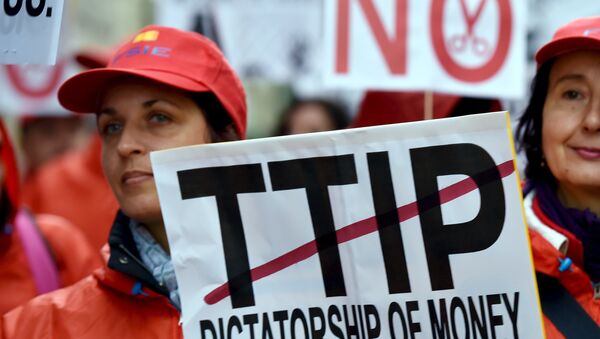The American Chamber of Commerce to the EU (AmCham EU) recently sponsored a new report entitled "TTIP and the EU Member States: An assessment of the economic impact of an ambitious Transatlantic Trade and Investment Partnership at the EU Member State level." The new study, according to contributing policy editor at Ars Technica, Glyn Moody, writing in an op-ed for the technology news website, simply mirrors the apparent bias of the earlier CEPR research and does not provide evidence strong enough to justify ratifying the TTIP.
After analyzing the report, Moody concluded that it unsurprisingly highlights the pretty aspects of the deal but ignores the many uncomfortable issues. Included in the biased fact-finding, the report suggests that exports will increase for all TTIP member states. But a core assumption in the methodology adopted by the AmCham EU study is that any increase in exports must be exactly matched by a corresponding increase in imports, an important point neglected by the deal's negotiators. Accordingly, the AmCham EU report doesn't find imports a topic worth discussing.
"So far, the AmCham EU report has mirrored CEPR's work, both in terms of its results and its problems-one of which is that neither report considers the costs of TTIP, only the benefits," Moody wrote.
Moody cited a description in the report of a 2014 consultation held by the European Commision (EC) on investor-state dispute settlements (ISDS), an attractive corporate liability enhancement feature which would allow companies to sue nation-states over regulations and sovereign laws that could be interpreted by that company as potentially causing a net loss of profit. The new study briefly mentioned the "overwhelming" negative reaction from the public, which forced the EC to identify four topics requiring further discussion.
"The "negative answers," according to Moody, are portrayed as little more than trivial nuisances that the EC has dealt with in addressing the four topics, all of which completely ignored a key point: millions of Europeans signed a petition stating that they did not want ISDS in any form. Moody noted that, "there is no discussion of that fact in the new study."
In Moody's view, the report proves that even in the most favorable circumstances, the "ambitious" deal will bring only vanishingly small economic gains for both the EU and US, while simultaneously presenting a clear and present danger, not only to the rights of ordinary citizens, but also to the laws of sovereign nations.







